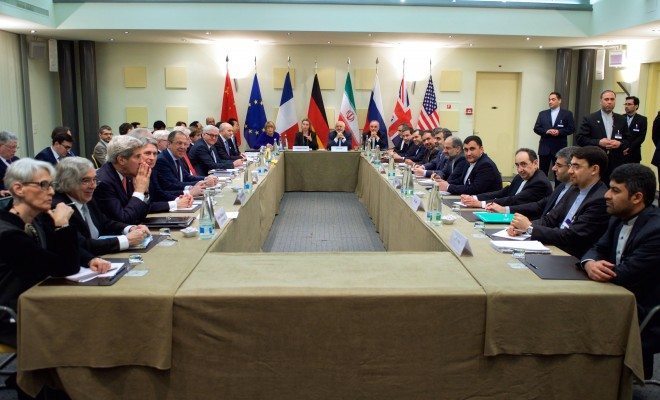 Image Courtesy of [United States Department of State via Flickr]
Image Courtesy of [United States Department of State via Flickr]
World
The Iran Nuclear Deal: America Remains Divided
Despite passionate and zealous opposition in the Republican-controlled Congress, the Iran deal, negotiated by the P5+1 nations (U.S, China, Russia, France, United Kingdom, and Germany), has survived and will begin to be implemented by the Obama administration. President Obama, having already secured enough Democratic votes in the Senate to sustain what was considered a prospective resolution of disapproval, also managed to garner enough votes to constitute a viable filibuster, which effectively removed the need of a presidential veto. Although the nuclear deal with Iran is perceived by many as being President Obama’s most significant foreign policy achievement, the opposition and debate surrounding the deal has not been toned down but instead magnified as the 2016 presidential candidates have made this deal a key area of debate and discord.
Since the next man or woman to occupy the Oval Office will directly decide whether to comply and continue implementation or derail it, the fate of the deal in the United States is not yet secure in the long term. Arguments for and against the Iran nuclear deal will continue to permeate politics and media from now until election day, and beyond. Read on to learn about the major arguments against the Iran deal and their counter-points–arguments that we’ll be sure to see continued as we move toward 2016.
Iranian Theocracy and Extremism
Argument Against the Deal
For those who oppose the deal, perhaps the biggest objection to entering into this agreement with Iran is the despotic nature of Iran’s regime. Critics of the deal believe that such a regime cannot be dealt with through traditional diplomatic channels. They argue that a country without a democratic grounding, mainly run by religious and ideological extremists who have vowed to destroy the United States and its allies, namely Israel, cannot be trusted and that any agreement is annulled by virtue of the extremism and radicalism of the regime.
Proponents of this view have argued that as a requisite for any deal, the U.S should demand certain concessions that alter the fundamental makeup of the regime. These concessions include the recognition of the right of Israel to exist as a state, or perhaps a change in the perennial “Great Satan” chants, which occur occasionally in Iran and disparage America. Former New York Mayor and presidential candidate Rudy Giuliani agrees with this position, arguing,
You can’t negotiate with a man who is calling for the destruction of the state of Israel, death to Americans…the only thing they understand, because they are insane, really, is the exercise of power.

Ruhollah Khomeini, the first supreme leader of Iran, and a symbol of Iranian theocracy and anti-Americanism.
Counter Argument
The counter argument to this position, which has been put forth by supporters of the deal, is tri-faceted. First, they argue that it is unrealistic and overly demanding to expect Iran to suddenly and abruptly change such core aspects of its government. Anti-Americanism, and to a lesser extent anti-semitism, are political norms in Iran which have been guiding principles since the Islamic revolution in 1979 and have continuously shaped the evolution of the regime. Therefore, such demands would be completely unpalatable for a political elite in Iran.
Secondly, they point out that despotic regimes with interests in direct conflict with our own should not be precluded from diplomatic relations with the U.S for those reasons alone. The U.S has in the past negotiated with the communist Soviet Union, for example, and achieved detente and the Nuclear Test Ban Treaty. Yet, the Soviet Union was arguably far more tyrannical, anti-American, and actually posed an existential threat to the U.S. Why should the U.S resist negotiating with Iran because of its political make up, if it did negotiate with the USSR?
Lastly, they argue that these core complaints are in some senses non-threatening and toothless anyways, as Iran is more of a rational state actor than we give it credit for, and that its ideological fervor is subordinated by a recognition of its weakness relative to the United States. Iran surely understands that any attack on Israel or the U.S would provoke a military response that would depose its government and do irreparable harm to the country. Some argue that self preservation is not beyond Iran, and the chants of death to America are perhaps nothing more than political posturing.
Sanction Relief and Economics
Argument Against the Deal
Another major criticism of the Iran nuclear deal is a natural extension of the previous criticism. Critics argue that if Iran is a theocratic despotic regime then we should expect the money that will flood into Iran upon sanction relief to be allocated to causes that are against our interests and the interests of our allies in the middle east, such as Israel.
Indeed, Iran, according to the U.S State Department, is one of only three countries in the world to sponsor terrorism and clearly pursues destabilizing efforts in the Middle East. According to a 2010 report released by the Pentagon Iran allocates between $100-200 million dollars a year to funding Hezbollah, a subversive terrorist militia based mainly in Lebanon which has caused many problems for the U.S and Israel.
All parties also agree, including the administration, that a sizable amount of the money received through sanctions relief could be channeled towards these terroristic, destabilizing pursuits. If all recognize this is true, then why should we consent to releasing this money to Iran, when we know they will use it to hurt us and some of our closest allies? Presidential contender Senator Ted Cruz argues this quite emphatically, by suggesting the Obama administration will become the world’s number one sponsor of terrorism:
Counter Argument
The counter argument to this objection is also multi-faceted. First, supporters of the deal point out that irrespective of U.S decision making, Iran will get a significant amount of money through sanction relief from the rest of the international community. The rest of the P5+1 will relieve sanctions regardless of what the U.S. does. These countries have have said so publicly to American leaders and as Michael Birnbaum from the Washington Post points out, the global community has already sent delegations. Birnbaum writes,
Congress is still deciding whether to approve the landmark nuclear deal with Iran, but European political and business leaders aren’t waiting for the outcome. Germany got in on the action first, with a government jet touching down at Tehran’s Imam Khomeini Airport just five days after the deal was signed. Since then, a representative from every major European power has visited or announced plans to do so.
The global community will not follow suit with American unilateralism when it comes to this Iran deal, and so Iran will receive sanction relief either way, some of which will most likely be channeled to its destabilizing activities. Indeed, in the scenario of an American rejection of the deal, Iran will still receive the influx of money.
A second point that serves to rebut the previous objection is that the current president of Iran, Hassan Rouhani, was elected on a largely domestic economic platform. Therefore it would be unrealistic for the most moderate Iranian president in recent times to simply ignore his promises of economic reform, and not appropriate a good portion of the money coming in to domestic economic causes. President Obama expressed this point clearly in an interview with NPR when he stated the following in reference to the funds:
Their economy has been severely weakened. It would slowly and gradually improve. But a lot of that would have to be devoted to improving the lives of the people inside of Iran.
The final portion of the counter argument touted by supporters has to do with a recent historical juxtaposition of President George H. W. Bush and his son, President George W. Bush. President George H.W Bush conducted what many perceive as being one of the more successful military operations in U.S history: the Gulf War. The Gulf War was a multilateral effort through the United Nations and other great powers which successfully protected the sovereignty of Kuwait against Iraqi expansionism and belligerence under Saddam Hussein. The global community through almost universal consensus defended Kuwait from Iraq, defeating the Iraqi army.
A decade or so later, his son President George W. Bush, took a different approach to Iraq and unilaterally and in defiance to the U.N invaded and deposed the Iraqi regime and Hussein, orchestrating what many consider to be one of the least advisable, and catastrophic foreign policy initiatives since the Vietnam War. With that history in mind, those who disagree with unilaterally subverting the global community when it comes to Iran see that choice as a potential repeat of the mistake of Bush 43. America may not be able to act alone anymore.
Conclusion
Regardless of which position is taken, the conversation regarding the deal is noteworthy and intriguing in and of itself. There has been little diplomatic or meaningful contact between Iran and the United States since the Islamic revolution, and Iran radically and indelibly pronounced its seemingly permanent departure and defiance to the United States, Europe, and Western civilization. Regardless of what transpires between now and November 2016, when the next president will either uphold or dismantle the agreement, the United States and the global community are entering a definitive juncture in which a new relationship is forming.
Resources
Primary
U.S. Department of State: State Sponsors of Terrorism
Additional
Federation of American Scientists: Unclassified Report on Military Power of Iran
NPR: Transcript: President Obama’s Full NPR Interview On Iran Nuclear Deal
Washington Post: These European Leaders and Businesses are Rushing to Do Deals with Iran
Bloomberg Business: Iran Gives Weapons to Re-Arm Hezbollah, Pentagon Says
Haaretz: Republicans Continue to Push Against Iran Nuclear Deal Despite Setbacks
PBS Frontline: The Structure of Power in Iran








Comments